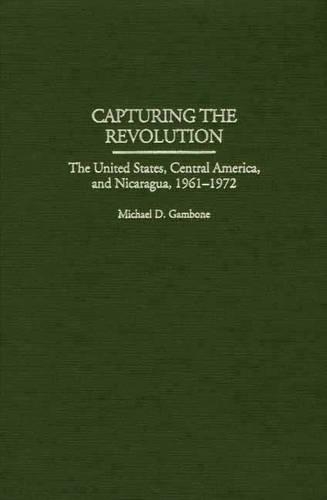
Capturing the Revolution: The United States, Central America, and Nicaragua, 1961-1972
(Hardback)
Available Formats
Publishing Details
Capturing the Revolution: The United States, Central America, and Nicaragua, 1961-1972
By (Author) Michael D. Gambone
Bloomsbury Publishing PLC
Praeger Publishers Inc
30th July 2001
United States
Classifications
Tertiary Education
Non Fiction
Revolutions, uprisings, rebellions
International relations
327.730728
Physical Properties
Hardback
288
Description
Focuses on the nature of revolution as it affected Latin America in the 1960s and the efforts designed to counteract or coopt this challenge through the Alliance for Progress. At the start of the 1960s, revolution challenged the established world order. In every corner of the underdeveloped world, discontent with the status quo fueled attempts to revoke colonialism and the strangleholds on power maintained by entrenched local oligarchies. This book examines the causes of revolution in the sixties and the various responses crafted to stop it, in particular, the Alliance for Progress, a program which represented the best products of American developmental and counterinsurgency theory. Equally important, however, is an examination of the independent policies implemented by Latin Americans themselves, often in direct opposition to those pursued by the U.S. For the United States the period represented a challenge to both its sovereignty and its leadership in the so-called "Free World." Perhaps more importantly, the disruptions blanketing the globe also pointed out the dramatic weaknesses of an American policy dominated by preparations for thermonuclear war with the Soviet Union. For Latin America, revolution challenged national stability and, in the cases of the regimes it was directed against, their very survival.
Reviews
Every serious student of modern Latin America and of US foreign policy in the region should consult this work. All academic collections. * Choice *
[A] classical study in diplomatic history a valuable contribution to a better understanding of a crucial period of US-Latin American relations. * Iberoamericana *
Gambone's work is exhaustively documented, cogently argued, effectively written, and fills a significant void in the current literature. Anyone interested in placing the Central America crisis of the 1970s and 1980s in its immediate historical perspective would be well advised to consult this study. * The Journal of Military History *
Author Bio
MICHAEL D. GAMBONE is Assistant Professor of History at Kutztown University. Dr. Gambone entered the active duty Army in 1985 where he served as an officer in the 82nd Airborne Division at Ft. Bragg, N.C. In 1997, he published his first book, Eisenhower, Somoza, and the Cold War in Nicaragua, 1953-1961 (Praeger Publishers). In 1999, he received a Fulbright to serve as Lecturer in American History at the Japan Woman's University.
